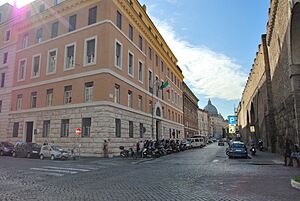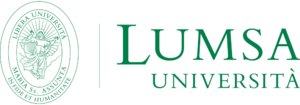Libera Università Maria SS. Assunta facts for kids
|
Libera Università Maria SS. Assunta
|
|
 |
|
|
Former name
|
Istituto Superiore di Magistero Maria SS. Assunta |
|---|---|
| Motto |
In fide et humanitate
|
|
Motto in English
|
In the faith and in the humanity |
| Type | Private |
| Established | 26 October 1939 |
| Founders | Luigia Tincani, Venerable Giuseppe Pizzardo Pius XII |
| Affiliation | BioGeM |
| President | Giovanni Lajolo |
| Rector | Francesco Bonini |
| Students | 7,200 |
| Location |
,
Italy
|
| Campus | Urban (multiple sites) |
| Language | Italian and English |
| Colors | Malachite and white |
|
Sporting affiliations
|
LUMSA Sport United |
 |
|
The Libera Università Maria SS. Assunta, usually called "LUMSA", is a private Roman Catholic university. It was started in 1939 in Rome. LUMSA is the second-oldest university in Rome, after Sapienza.
Even though LUMSA is a private university, it is part of Italy's national university system. This means it can give out official degrees and diplomas that are recognized by law. LUMSA focuses on human values and has a Catholic background. It believes in using knowledge to help people and communities grow. The university is also part of national and international research groups. It studies many subjects like education, social services, philosophy, literature, mass communications, law, economics, computer science, and data science.
Contents
How LUMSA is Organized
LUMSA started in 1939 as the "Istituto Superiore di Magistero Maria Ss. Assunta". It was an educational place mainly for nuns. Luigia Tincani founded it. In 1989, it became the "Libera Università Maria SS. Assunta" (LUMSA). At first, it was only for women. But in 1991, men were also allowed to study there.
LUMSA is a private Catholic school that can make its own decisions about how it runs. Because it is approved by Italy, its degrees are just as good as those from public universities.
A group of leaders runs the university. This group includes a President, a Rector, two Pro-Rectors, and a Director General. Since 2017, Cardinal Giovanni Lajolo has been the President.
LUMSA has three main departments where students learn:
- Department of Law, Economics, Politics, and Modern languages (in Rome)
- Department of Law (in Palermo)
- Department of Human Studies, Communication, Education, and Psychology (in Rome)
Research at LUMSA
Research and study are very important for any university. At LUMSA, research always involves talking about big ideas and current topics. Over the years, professors and students have done many individual and group research projects. They also work with other universities and international groups. These projects often get money from public and private groups, or from the university itself. Today, research happens in special centers within the three main departments.
Learning at LUMSA
LUMSA University combines old traditions with new ideas. It brings together subjects like history and philosophy with modern topics like economics, computer science, and management. Another important thing about LUMSA is that it helps students who need financial support. The fees for students from lower-income families are almost the same as those at public universities.
LUMSA offers different types of degrees. Students can earn undergraduate degrees (called laurea in Italy) in many social science fields and in data science. For students who want to study more, LUMSA has several graduate programs. It also offers two longer programs in law and education sciences. Plus, there are four PhD programs (called dottorato di ricerca in Italy) for advanced research.
Famous People and Alumni
Many interesting people have been part of LUMSA. Here are some of them:
- Joseph Ratzinger (who later became Pope Benedict XVI), received an honorary degree in Law in 1999.
- Liliana Segre, received an honorary degree in International Relations in 2020.
- Sergio Cotta, received an honorary degree in Law in 1999.
- Liliana Cavani, received an honorary degree in Communication Sciences in 1999.
- Carlo Lizzani, received an honorary degree in Media Studies in 2009.
- Giuseppe Pizzardo, one of the university's co-founders.
- Luigi Traglia, a former president.
- Mario Luigi Ciappi, a former president.
- Antonio María Javierre Ortas, a former president.
- Carlo Furno, a former president.
- Attilio Nicora, a former president.
- Cornelio Fabro, a former director.
- Conte Giuseppe Dalla Torre del Tempio di Sanguinetto, served as rector from 1991 to 2014.
See also
- List of Italian universities
- BioGeM consortium

